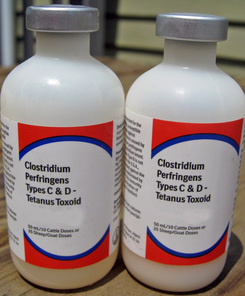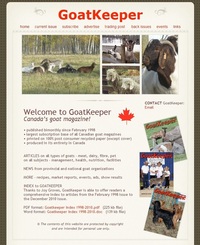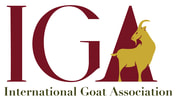|
Introduction
While domestic goats are not native to Canada, they have proven to be extremely adaptable to our diverse resources, climate, and geography. In this relatively young and growing sector of agriculture, the central focus of the Canadian goat industry is production of milk, meat, and fibre managed under a variety of housing and grazing systems. Ontario and Quebec are the main producers of goat products in Canada. Goat milk is mainly made into cheese with a lesser amount being processed into yogurt, ice cream, fluid milk, butterfat, and powdered milk. Goat milk production is a small proportion of total milk production in Canada; however, there has been substantial growth in the number of animals, farms, and total milk produced. In Canada, the number of meat and dairy goats has increased from 230,034 goats reported in the 2016 Census to 253,278 goats on 4,801 Canadian farms in 2021 (20, 21). New Canadians also continue to support their cultural traditions and food preferences which often include goat meat. To meet this demand, the availability of goat meat in larger cities is increasing. Due to their naturally curious and interactive nature, goats are also commonly featured in agri-tourism and unique small businesses such as pack animals, targeted grazers, exercise companions, petting zoos, and entertainment. They are also commonly kept as companion animals, pets, or in small hobby herds. Regardless of their purpose, the same principles of responsible care and management must be practiced across the industry to safeguard the well-being of goats. An animal is in a good state of welfare if (as indicated by scientific evidence) it is healthy, comfortable, well nourished, safe, able to express innate behaviour, and if it is not suffering from unpleasant states such as pain, fear, and distress (11). Codes of Practice strive to promote standards of care that reflect achievable balances between animal welfare and producer capabilities. This Code updates the 2003 goat Code of Practice. It attempts to reflect both modern and traditional management practices while seeking to advance animal welfare as described by NFACC.
0 Comments
 IGA Country Representative for Western Canada Zoë holds a master’s degree of Animal Science from the Charles Sturt University along with Diploma in Agriculture from the University of Guelph. Zoë has been involved with the goat industry for over 30 year, from founding local goat associations to working on provincial issues such as Mycoplasma ovipneumoniae transmission between domestic and wild sheep and goats in BC to advocating for policy change in the Canadian import regulations involving S146 and K222 scrapie genotyping. In the last three decades she has also facilitated goat management educational seminars and materials. She has owned several goat breeds since childhood and currently enjoys working with a herd of purebred Nubians. Currently Zoë is the president of the British Columbia Goat Association as well she is Canadian Goat Society Licensed Dairy Goat judge. Want to learn more about our other Country Representatives? Click here.  Check out this great article over at Ontario Goat. Good animal welfare is defined, for the purposes of this article, as when an animal has both its physical needs (adequate housing, food, and water, and good health) and mental needs (able to perform normal behaviours, not frustrated, fearful, or distressed) met. There are many perspectives on animal welfare. Some may think that an animal that is producing well has good animal welfare while others think that animals with a high level or production must have poor welfare. In reality, the link between production and welfare is more complex. This graph, adapted from one created by Richard M. Bennett from the University of Reading in the UK, represents a simple theory on the relationship between welfare and productivity. READ MORE… “Keeping Small Ruminants Healthy and Productive” The purpose of this conference is to provide an opportunity for veterinarians, researchers, educators, producers and support industries to share knowledge and ideas on improving and maintaining the health of sheep and goats, not just in Canada but around the world. SRVO has been offered the unique opportunity to present this conference in conjunction with the Sheep Veterinary Society of the UK as their quadrennial “European” meeting.
We are soliciting abstracts for presentations and posters on research findings, case reports, practice tips related to disease issues in sheep and goats. We are offering technical tours, including farm visits, some tourist delights and a pre-conference tour for those coming from away. We guarantee there will be something for everybody with an interest in the health of sheep and goats. Abstract
Background A clear association of amino acid variation in the prion protein gene (PRNP) with susceptibility and resistance to classical scrapie exists in sheep, but not in goats. In this study we examined DNA sequence variation in the PRNP of 149 animals from two scrapie-infected herds of Saanen dairy goats, and identified 6 non-synonymous variants in the coding region. Which meat goat breed is best?
Canada is home to Boer, Kiko, Spanish, and Myotonic meat goats. Each meat goat producer will be able to tell you why they raise a specific breed, a combination of breeds, or cross breed of two or more breeds on their farm. However, what works well on one operation may not be ideal for all situations. While insight from experienced meat goat producers is invaluable, recent science has been investigating the profitability of different breeds of meat goats.  Written by Susan Schoenian, IGA member, and Sheep & Goat Specialist, University of Maryland Co-operative Extension There are many diseases for which sheep and goats can be vaccinated, but there is only one universally-recommended vaccine, and it is for the clostridial diseases that commonly affect small ruminants. Clostridial diseases are fatal diseases that strike ruminant livestock suddenly, often causing death before any clinical signs are seen. Clostridia (bacteria) are widespread in the environment. They are normally found in the soil and feces. They are also present in the digestive tract and tissues of healthy animals. For these reasons, vaccination is the best way to prevent disease outbreaks. Two clostridial vaccines are commonly used in sheep and goats: a 3-way vaccine called CDT; and an 8-way vaccine. CDT protects healthy sheep and goats against clostridium perfringens type C and D (overeating disease) and clostridium tetani (tetanus). The 8-way vaccine protects against these same diseases, plus several additional clostridial diseases, including blackleg. The 3-way vaccine is probably all that’s needed on most sheep and goat farms. Written by Stephan Wildeus, IGA Regional Director for USA, Canada & Puerto Rico.
Four national main goat events were held in the U.S. in 2013. The American Dairy Goat Association Conference and Annual Convention, an eight-day event held in Asheville, NC. Shows and workshops were held during the convention. The IGA Secretary-Treasurer gave a workshop on “Integrated Gastrointestinal Parasite Control and FAMACHA Certification” and another on ‘Forages for Meat Goats”, and the official IGA poster, membership applications and ERCG2014 were displayed. The IGA secretary-treasurer also spoke briefly at one of the board meetings, describing IGA activities and thanking the American Dairy Goat Association for their sustained institutional financial support. The 10th Anniversary of the American Consortium for Small Ruminant Parasite Control at Fort Valley State University, GA. This Integrated Parasite Management/Train-the-Trainer Conference educates stakeholders in the small ruminant industry on the most up-to-date methods and recommendations for gastrointestinal parasite control as well as providing training and certification in Integrated Gastrointestinal Parasite Management. Three IGA board members (Felipe Torres Acosta, Hervé Hoste and Jean-Marie Luginbuhl) are also members of the American Consortium and made oral presentations.  Special thanks to GoatKeeper for this report. Producers from around the province came together in Camrose, Alberta, September 27, 28, and 29, to celebrate their involvement in Alberta's goat industry. The event kicked off with a BBQ and social Friday night, and although the weather was nippy it, didn't dampen producers' spirits as everyone enjoyed the food, catching up with their fellow producers and making new friends. |
IGA Blog
The International Goat Association promotes goat research and development for the benefit of humankind, to alleviate poverty, to promote prosperity and to improve the quality of life. Archives
May 2024
Categories
All
|
|
International Goat Association
2516 Millbrook Rd., Little Rock, AR72227 USA email: [email protected] -454-1641 |


 RSS Feed
RSS Feed